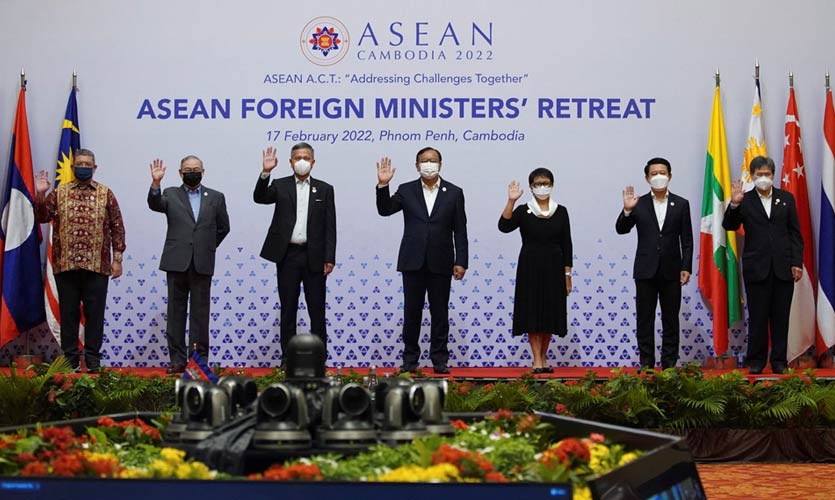ASEAN member nations met in Cambodia on Thursday amid a division in the bloc over what to do about Myanmar, following the military coup a year earlier. According to Reuters, the junta’s representative has been barred from attending.
According to the Print, initial plans called for the event to take place in January, but it was postponed after Cambodia clashed with other nations over its position on Myanmar. It was expected that discussions will focus on how to realise the ‘Five-Point Consensus’ concerning Myanmar after the military coup in February last year, according to NHK World. The consensus was reached at the last ASEAN summit. NHK World reported that its proposals include an immediate cessation of violence in Myanmar, and a dialogue among all parties concerned, mediated by an ASEAN envoy.
In Myanmar, on February 1, 2021, a coup began when democratically elected members of the country’s ruling party, the National League for Democracy (NLD), were ousted by the Tatmadaw – the military – which instituted a stratocracy.
BBC reports that opposition activists had formed the Campaign for Civil Disobedience (CDM), and have helped organise strikes and protests against the coup. The military defeated them by shooting them with live ammunition, water cannons and rubber bullets. What started as civil disobedience has now essentially turned into a civil war in Myanmar. Assassinations have taken place by militias calling themselves People’s Defence Forces, or PDFs.
On July 20, 2021, the government reportedly tortured and killed 40 civilians in the Sagaing district, a stronghold of the opposition. The Assistance Association for Political Prisoners (AAPP), which keeps track of those killed, detained or jailed by the military, reports 1,503 deaths since the military regime came to power. Acled, a human rights organisation based in the United States that compiles statistics from news reports and publications, says that approximately 12,000 people may have died. The junta has denied the death toll and blamed an unknown number of “terrorists”.
A report released this week by the non-profit organisation Fortify Rights accused the Myanmar military of atrocities in Kayah State, which has been a scene of fierce fighting, and called upon the ASEAN to support an arms embargo against the junta.
The ten-nation Association of Southeast Asian Nations (ASEAN), currently led by Cambodia, suddenly barred Myanmar’s military government last year from attending key meetings over a failure to adhere to a peace plan agreed with the group. In an effort to re-engage the junta, Cambodian Prime Minister Hun Sen sought the ASEAN’s approval, but the meeting was postponed because the military-appointed ambassador for Myanmar was not welcome.
“No doubt we might have different views occasionally on some issues but what family doesn’t have them,” Cambodian Foreign Minister Prak Sokhonn told reporters in Phnom Penh.
Besides the foreign minister of the junta who was barred, a number of ASEAN ministers did not travel and were supposed to attend virtually after an outbreak of coronavirus in Southeast Asia.
On Wednesday, the Cambodian prime minister defended his decision to visit Myanmar for talks last month, saying that peace in the conflict-torn nation may not be achieved even in five to ten years without a breakthrough.
Southeast Asian nations including Singapore, the Philippines, Indonesia, and Malaysia are urging Cambodia not to invite Myanmar’s generals until they deliver on their promises to end hostilities, and allow the ASEAN to facilitate a peace process. Singaporean Foreign Minister Vivian Balakrishnan said that the lack of progress in implementing the peace plan was “disappointing”.
Read more: Myanmar To Release Over 5,000 Jailed Anti-coup Protesters
While the ASEAN has not recognised Myanmar’s military government, it has been targeted by sanctions imposed by nations the US, UK, and the European Union.
A statement by the Myanmar foreign ministry this week expressed regret over the ASEAN’s decision to exclude Myanmar’s representative, which it said violated the bloc’s principle of equal representation.
In taking a tough line on Myanmar, some ASEAN members broke with a long-standing policy of not interfering in each other’s affairs, which critics said made the group toothless when it came to issues such as human rights. Thailand, Laos, and Brunei are also ASEAN members.










